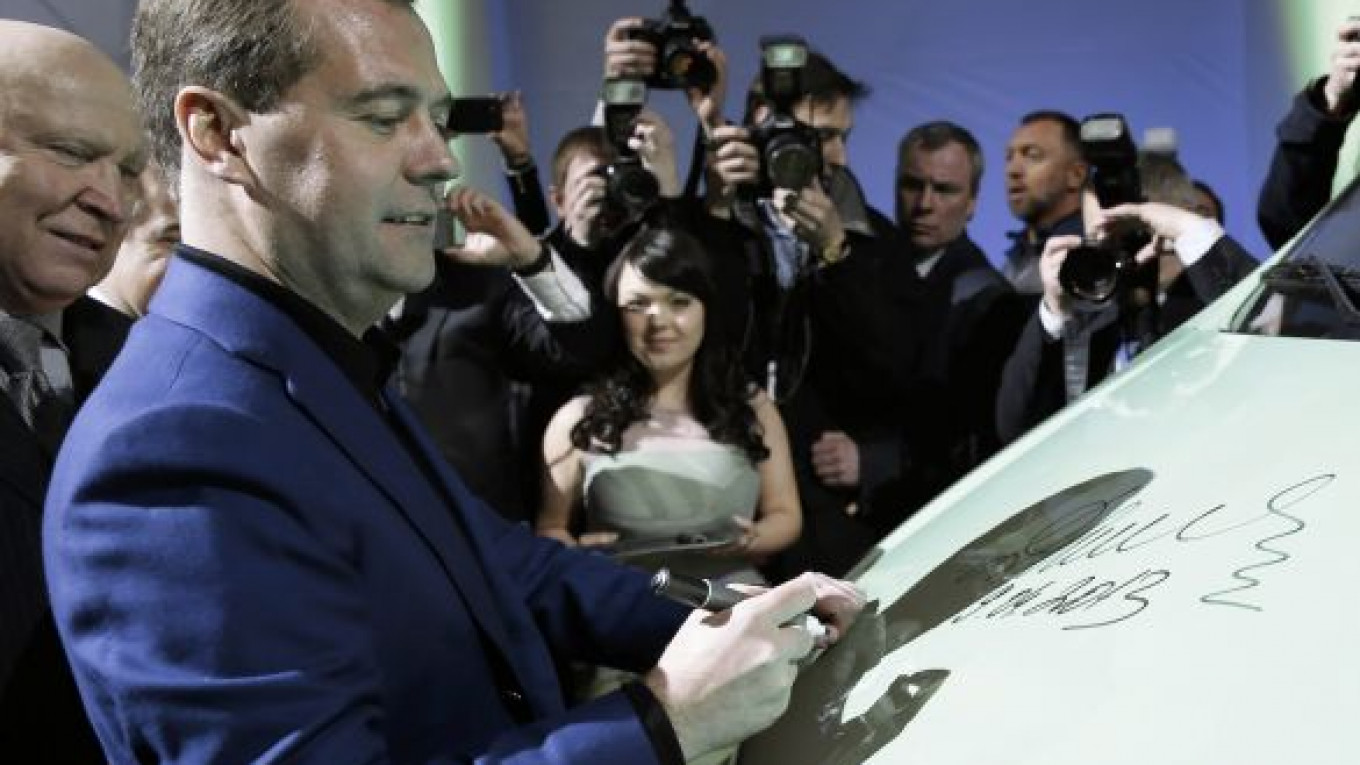NIZHNY NOVGOROD — Billionaire Oleg Deripaska's automaker GAZ on Tuesday started making a new model of the country's ubiquitous light trucks in a bid to cement its lead in the market.
The GAZelle Next is the first vehicle that the company developed from scratch under the watchful eye of Bo Andersson, a former General Motors purchasing executive now working to turn around the major Russian industry player.
He said he visited GAZ engineers every morning to make sure the effort to produce the new generation of the trucks was on track.
"Every second time they were glad to see me," Andersson joked at a news conference. He told The Moscow Times afterward that, "I pushed them a lot for price, quality and safety."
The model had to undergo a complete makeover in order to maintain a strong lead in the market where rival brands have made strides.
The model had to undergo a complete makeover in order to maintain a strong lead in a market where some rival foreign brands have made strides despite being 30 percent more expensive.
GAZ' sales of light commercial vehicles slid 2 percent last year, according to market research agency Avtostat. For Mercedes-Benz and Ford, the number soared 50 percent and 44 percent, making them growth leaders, Avtostat said.
GAZelle Next's mission is to ensure that its producer's grip on the market does not slip.
"This product will allow us to continue to hold the ground that we are holding," Deripaska, the principal owner of GAZ, said in a separate news conference on the plant's premises.
He had been inspecting the assembly line for the new vehicle, wearing casual slacks and a jacket labeled "The North Face," a brand much more popular with the less affluent. As he spoke to reporters, he took on the role of an interpreter at times, translating some of the questions into English for Andersson, who stood alongside.
Andersson said at the earlier news conference that it was crucial to update the product because the original GAZelle is 20 years old. The company modified it somewhat in 2010.
Even as GAZelle sales hit a snag last year, businesses still chose this small truck most often — largely thanks to its low price — buying a total of 75,500 units. Mercedes-Benz trails far behind, with close to 4,000 vehicles sold over the same time.
Prime Minister Dmitry Medvedev joined Deripaska and GAZ executives and employees for a ceremony where he pressed a symbolic button to get the new assembly line going. He then walked around the plant and climbed into one of the new Gazelles and a few prototype models that will use its chassis. Deripaska and the foreign top executives the billionaire hired to run his automotive business briefed the prime minister on the vehicles in English.
The new GAZelle managed to maintain the best-in-class price, starting at 699,000 ($22,404) rubles, although it uses many foreign-made components, such as Bosch brake systems and ZF steering gear.
GAZ invested 2 billion rubles in the project, including acquisition of dye stamping equipment from Japan's Komatsu.
Some of the tests for the vehicle ran in Spain, at a ground owned by one of the world's leading automotive certification companies, Applus IDIADA.
GAZ aims to produce 22,000 GAZelle Next trucks this year. Over time, it looks to export the vehicle globally, focusing on Turkey, Poland and Germany.
Introduced in the early 1990s, the affordable GAZelle was a lifeline for many small businesses after the Soviet collapse. Under the communists, the industry churned out only large trucks, and GAZ was the first to offer a lighter alternative.
Contact the author at medetsky@imedia.ru
Related articles:
A Message from The Moscow Times:
Dear readers,
We are facing unprecedented challenges. Russia's Prosecutor General's Office has designated The Moscow Times as an "undesirable" organization, criminalizing our work and putting our staff at risk of prosecution. This follows our earlier unjust labeling as a "foreign agent."
These actions are direct attempts to silence independent journalism in Russia. The authorities claim our work "discredits the decisions of the Russian leadership." We see things differently: we strive to provide accurate, unbiased reporting on Russia.
We, the journalists of The Moscow Times, refuse to be silenced. But to continue our work, we need your help.
Your support, no matter how small, makes a world of difference. If you can, please support us monthly starting from just $2. It's quick to set up, and every contribution makes a significant impact.
By supporting The Moscow Times, you're defending open, independent journalism in the face of repression. Thank you for standing with us.
Remind me later.






